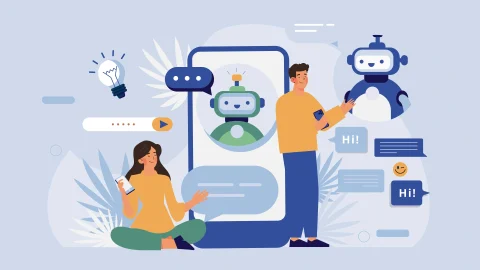Artificial intelligence (AI) is becoming more than just a future term; it is the engine that propels how companies interact with their target markets. By 2025, there are higher expectations than ever before for AI chatbot development firms. More sophisticated, customized, and safe chatbots that engage consumers and effectively address actual issues are increasingly in high demand from businesses.
Whether you’re a startup or an enterprise, choosing the right artificial intelligence chatbot development company can be a game-changer. But what features should you expect from a top-tier provider in 2025? Let’s dive in.
1. Advanced Natural Language Processing (NLP)
Modern users expect chatbots to understand them like a human would — not just react to keywords. In 2025, a competent chatbot development company must offer state-of-the-art NLP capabilities, including:
- Multilingual understanding and response
- Sentiment analysis to gauge user emotions
- Context retention across conversations
- Ability to understand slang, typos, and natural speech patterns
NLP is at the core of user satisfaction. A chatbot that gets the user will always outperform generic ones.
2. Personalization & Behavioral Intelligence
AI chatbots in 2025 aren’t just reactive; they’re proactive and adaptive. Expect chatbot companies to integrate machine learning models that learn from:
- Past conversations
- Purchase history
- Time of interaction
- User behavior on your website or app
This allows the chatbot to offer tailored suggestions, timely prompts, and even predictive assistance — making interactions more valuable and relevant.
3. Omnichannel Deployment
Your customers are everywhere — websites, mobile apps, WhatsApp, Facebook Messenger, Instagram DMs, and even smart devices. A reliable AI chatbot development company must offer:
- Seamless chatbot deployment across multiple platforms
- Unified user experience regardless of the channel
- Centralized analytics and chatbot training across all touchpoints
This ensures that users can start a conversation on one platform and continue on another — without missing context.
4. Voice-Enabled Conversations
Text-based chatbots are great, but voice interfaces are on the rise. In 2025, voice-enabled AI chatbots are essential for:
- Hands-free interactions (especially for mobile and IoT users)
- Accessibility for visually impaired users
- Integration with voice assistants like Alexa, Google Assistant, and Siri
Make sure the chatbot company offers text-to-speech (TTS) and speech-to-text (STT) capabilities with real-time voice recognition and personalization.
5. Seamless Integration with Third-Party Tools
Your chatbot is only as smart as the ecosystem it lives in. Top AI chatbot development companies should offer:
- Easy integration with CRMs like Salesforce or HubSpot
- Payment gateways and e-commerce platforms
- Calendar booking tools, inventory systems, and ERP software
- Custom APIs to connect with legacy tools
This allows the chatbot to do more than chat — it can schedule appointments, process orders, fetch data, or even trigger workflows.
6. Hyper-Automation with AI Workflows
Chatbots in 2025 are expected to be deeply embedded into automated business workflows. Companies should offer:
- No-code or low-code automation builders
- Workflow triggers based on user behavior or chatbot events
- AI-assisted decision-making paths
This transforms your chatbot into a digital operations assistant, capable of streamlining customer service, HR, lead generation, and more.
7. Enterprise-Grade Security and Compliance
With privacy laws like GDPR, HIPAA, and CCPA, data protection is non-negotiable. Expect your chatbot provider to offer:
- End-to-end encryption for chatbot conversations
- Role-based access control for admin dashboards
- Audit logs and data retention policies
- Regular penetration testing and compliance certifications
Security isn’t just a feature — it’s a trust-building foundation.
8. Real-Time Analytics & Performance Insights
You can’t improve what you don’t measure. In 2025, top chatbot development companies must provide:
- Detailed dashboards for user interaction metrics
- Sentiment trends and conversion funnels
- A/B testing for conversation flows
- Suggestions for optimization based on AI feedback loops
Analytics help you train your bot continuously and ensure it evolves with your customers.
9. Human Handoff and Hybrid Support Systems
AI is powerful — but it can’t replace humans in every situation. That’s why a strong chatbot should include:
- Smooth handoff to live agents when required
- Chat history transfer for context continuity
- Agent assist tools powered by AI to enhance human responses
- Ability to schedule follow-ups or callback requests
This hybrid model ensures the best of both worlds — the efficiency of AI and the empathy of humans.
10. Continuous Learning & Scalability
The best chatbot isn’t static. It learns. It grows. It scales.
Expect a company that provides:
- Automated learning from conversation logs
- Easy retraining of intents and responses
- Scalable infrastructure that can handle thousands of concurrent users
- 24/7 monitoring and support
With cloud-native architectures and modular design, modern chatbots are built to grow with your business.
Conclusion
The expectations of customers are changing along with AI. By 2025, chatbots will be strategic assets rather than just support tools. Selecting the best artificial intelligence chatbot development business is essential whether your goal is to improve lead generation, expedite customer service, or provide round-the-clock assistance.
Seek suppliers who combine cutting-edge technology, a solid grasp of user experience, secure architecture, and a commitment to long-term support. Because conversation in the future will be both human and AI.


